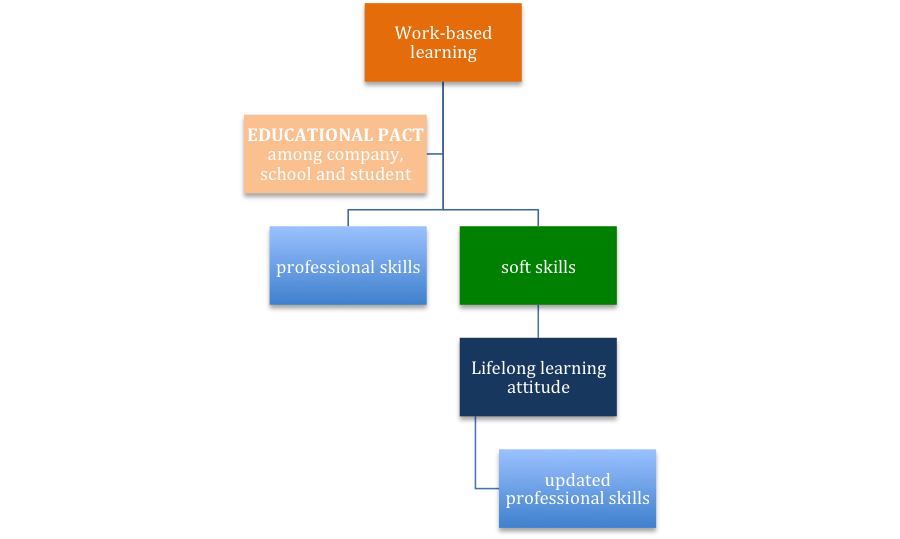VET, at both European and Italian level, faces an increasing number of challenges, as pointed out in the recent EU New Skills Agenda (EC, 2016; Nardi, 2017). Work-based learning, based on collaboration between schools and companies, seems to be the right pathway to cope with the problems of skills mismatch and unemployment. However, is it sufficient to effectively face these major challenges?
The experience of the authors, in particular in the context of Cometa Formazione – Oliver Twist VET school1, shows the relevance of new approaches in the school system, namely VET. A system where developing students’ capabilities (Nussbaum, 2011) becomes the main goal of teaching and training activities: future workers need not only professional skills for a (less and less) permanent job, rather they have to develop personal capabilities to keep themselves employable and smart citizens, the only way to safeguard social cohesion in the next decades (Nussbaum 2010; Alessandrini, 2014).
In a nutshell, school should not be required anymore to give only information: education implies to be able to inquiry reality, to catch the meaning and the beauty of it, but, above all, to make the right questions; henceforth, to support students to a deep self-knowledge, pointing out their capabilities and their potential “excellence” as human being (Nussbaum, 2011). A task within everybody’s grasp.
(Articolo a cura di Franco Ferrazza e Paolo Nardi, realizzato grazie ai contributi del progetto Erasmus+ Trio2Success)
Changes affect socio-economic context, including job market
One needs to recognize how the world is changing exponentially. Former Shell VP Hans Van der Loo, during his speech to the European Business Summit delegates in Brussels, outlined the main elements of this paradigm shift to the new “Anthropocene” era: “Today we are educating our young for jobs that do not yet exist, in order to solve problem we are not yet even aware of. Only few seem to be aware of the exponential reality [Bartlett, 2007] and we seem to think we can tackle 21st century challenges with 20th century education”.
Some implications on the socio-economic context are emerging clearly:
- a faster obsolescence of “things”: most of the daily tools and instruments, habits too, change at a highly fast speed. Not only daily life is continuously affected by this phenomenon, but also the job market and its conditions are changing inexorably;
- demographic changes, among the others, are producing a general impact on welfare systems, in particular in the pension systems. People will get retired later and later: before that, most of them will have to be able to change their usual tasks and activities, which cannot be achieved anymore because of their age. To this extent, people should be flexible and able to be adaptive to new contexts and goals.
According to this view, focusing on education and training, it is evident how entrepreneurial skills become crucial not only for future entrepreneurs, but for everybody as self-entrepreneur. Entrepreneurship becomes in fact a mindset essential both in the job environment (to feel oneself responsible for the own tasks but also for the company as a whole) and in the job market, as a cultural condition to face challenges and changes emerging in the daily life. In particular, self-entrepreneurship as a key driver to a successful career includes at least 3 main elements:
- the ability to search effectively a job;
- the ability to get a job (self-marketing);
- being constantly employable, even in periods of great changes.
Work-based learning: a positive tradition with ancient roots
Work-based learning, in this context, can be an effective tool, although, as a tool, can be positively or badly used. From a theoretical point of view, scholars and practitioners agree that learning is an activity possible in every moment and every context of one’s existence; in particular working activities, as far as they stimulate new challenges, are crucial for continuously coping with problems and possible solutions, making people able to get new knowledge and competences (Mortari, 2003).
To some extent, the Italian tradition of medieval workshops or the Renaissance studios, as well as the countless small artisanal micro- or small enterprises promoting the Made in Italy and the Italian way of life worldwide, are an example of perfect context where education and training do not focus only on professional skills. In the Middle Age, the craftsman assumed a parental role to trainees in the workshop, making them adults not just workers. Sennett, in his work “The Craftsman”, underlines the relationship between «hand and head, technique and science, art and craft»; the workshop (then a “workshop-home”) becomes a centre of culture; craftsmanship, according to Sennett, can be intended as “an enduring, basic human impulse, the desire to do a job well for its own sake” (2008). It is one of the best examples of experiential learning represented by the concept of homo faber: an experience shared by Ancient Greece, China, Medieval and Renaissance Europe. In the laboratorium “theoretical thinking” has to be in connection with “technical making” and practice; they mix together in the action, with the same dignity (Gardner, 1983).
This approach includes practices and mindset inspiring for scholars and policy-makers involved in the reform of education, training and employment, in terms of methods and impacts (Alessandrini, 2014). However, it is clear that rather than rooted only on work-based learning, the needed competences for our “unknown future” (Mulder, 2016) depend on the activities of training and counselling: in particular, whether or not, beside the work experience, trainers are able to stimulate in the students/apprentices a lifelong learning attitude.
From “tayloristic” school to “tailor-made” education and training
As mentioned, education and training in the XXI century does not concern (mainly) professional skills; soft skills and a growth mindset attitude have a crucial role. This is the reason why work-based learning, notwithstanding the importance recently given to it by policy-makers, is not a solution per se, but it requires specific conditions to be effective. To train students to “learn how to learn, constantly”, requires key actors (namely companies, educators and students themselves) to have a strong commitment, since the definition of the contents of the learning agreements behind any work-based experience.
Beside the relevance of the organizational elements of any job experience during IVET, at the very core of this activity, both the quality and the commitment of actors play a crucial role: excellent trainees require the support of excellent trainers to make their job experience successful. Timing and location have only a secondary importance. Furthermore, the relevance of their educational support can only be rooted on a business-education partnership aiming at realizing a “tailor-made” project for each student. Unprepared internships, for instance, can be highly unsuccessful, while an effective learning agreement usually implies a deep and regular partnership between the company (tutor) and the school (tutor). A real educational pact, among company, school and each student, is the key issue.
This idea is based on a simple assumption which cannot be taken for granted: vocational education and training should not be finalized exclusively (or mainly) to learn specific professional tasks. The fast technological changes happening in the current age, make learning professional skills less important and effective in a lifelong learning perspective. At the same time, non-cognitive skills are considered more and more relevant for the development of human capital. The famous Heckman’s Big 5 (extraversion, agreeableness, conscientiousness, neuroticism, openness to experience), in his research, as well as in following studies, are emerging as essential skills to build a “character”, someone able to stand in front of continuous challenges, willing to shape her own career, not just preserve a job place (Vittadini, 2016).
To this extent, an effective learning agreement between company and school, with the explicit involvement of the students, should rely on both soft and professional skills, outlining their points of strength and fortifying their points of weakness, in order to make the students’ human value to thrive. This is the greatest condition to make a person able to work, namely in the current economic and social scenarios.
Policy implications
The most recent decisions of the European Commission, as well as of the Italian reform of education, seem very important to the authors: investing in (long term) international internships, students’ international exchanges, as well as supporting work-based learning methods, are crucial tools to boost the quality of vocational education and training. Notwithstanding these relevant supports, without any clear pact between the business and the educational systems, and, more concretely, without any concrete agreement on a tailor-made project in favour of (and with) the student, these tools can be neither effective nor, sometimes, useful.
Henceforth, some final remarks can be suggested for the stakeholders’ debate:
- investing in research on innovative methods and tools for training (exchange of good practices, guidelines for teaching/training methods, counselling and coaching scenarios and tools, even new curricula for teachers and trainers);
- supporting companies in a new vision on recruitment, as well as on internships, empowering the quality of business-education partnerships and outlining more clearly the contents and the management of learning agreements;
- encouraging CVET and in particular VET at tertiary level, as work-based learning can foster the development of not only professional skills, but also soft skills and life-long learning attitude;
- strengthening researches and observatories on the emerging jobs and competences for the future, making both companies and educational organizations aware of the evolution of the socio-economic context they live in.
References
Alessandrini, G. (2014), Generare capacità: educazione e giustizia sociale, in Alessandrini, G. (ed.), La «pedagogia» di Martha Nussbaum. Approccio alle capacità e sfide educative, FrancoAngeli, Milan.
Bartlett, A. (2007), Arithmetic Population and Energy: Sustainability 101, video available at: http://www.albartlett.org/presentations/arithmetic_population_energy.html (last access: 31-07-2017).
European Commission (2016), Communication: A New Skills Agenda for Europe – Working together to strengthen human capital, employability and competitiveness, available at: http://ec.europa.eu/social/BlobServlet?docId=15621&langId=en (last access: 31-07-2017).
Gardner, H. (1983), Formae Mentis. Saggio sulla pluralità dell’intelligenza, Feltrinelli, Milan.
Mortari, L. (2003), Apprendere dall’esperienza. Il pensare riflessivo nella formazione, Carocci, Rome.
Mulder, M., ed. (2017), Competence-Based Vocational and Professional Education. Bridging the Worlds of Work and Education, Springer, Cham.
Nardi, P. (2017), The steps toward excellence in VET: an overview on recent policies, available at: https://cometaresearch.org/non-categorizzato/the-steps-toward-excellence-in-vet-an-overview-on-recent-policies/?lang=it (last access: 31-07-2017).
Nussbaum, M.C. (2010), Not for profit: why democracy needs the humanities, Princeton University Press, Princeton NJ.
Nussbaum, M.C. (2011), Creating Capabilities. The Human Development Approach, The Belknap Press of Harvard University Press, Cambridge.
Sennett, R. (2008), The Craftsman, Yale University Press, New Haven.
Van der Loo, H. (2016), Paradigm Shift For An Exponential Era. Speech at the European Business Summit (May 7th 2016), available at: http://www.ebsummit.eu/content.php?id=389 (last access: 31-07-2017)
Vittadini, G. ed. (2016), Far crescere la persona. La scuola di fronte al mondo che cambia, Fondazione per la Sussidiarietà, Milan.


